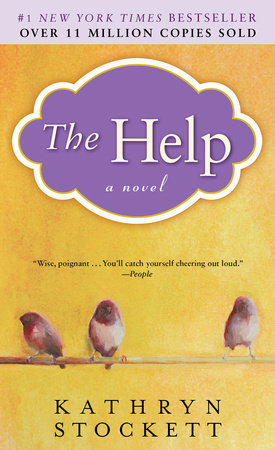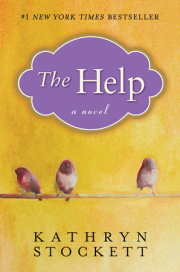Two days later, I sit in my parent's kitchen, waiting for dusk to fall. Igive in and light another cigarette even though last night the surgeongeneral came on the television set and shook his finger at everybody,trying to convince us that smoking will kill us. But Mother once toldme tongue kissing would turn me blind and I'm starting to think it'sall just a big plot between the surgeon general and Mother to make sureno one ever has any fun.
At eight o'clock that same night, I'mstumbling down Aibileen's street as discreetly as one can carrying afifty-pound Corona typewriter. I knock softly, already dying foranother cigarette to calm my nerves. Aibileen answers and I slipinside. She's wearing the same green dress and stiff black shoes aslast time.
I try to smile, like I'm confident it will workthis time, despite the idea she explained over the phone. "Could we…;sit in the kitchen this time?" I ask. "Would you mind?"
"Alright. Ain't nothing to look at, but come on back."
The kitchen is about half the size of the living room and warmer. It smellslike tea and lemons. The black-and-white linoleum floor has beenscrubbed thin. There's just enough counter for the china tea set. I setthe typewriter on a scratched red table under the window. Aibileenstarts to pour the hot water into the teapot.
"Oh, nonefor me, thanks," I say and reach in my bag. "I brought us some Co-Colasif you want one." I've tried to come up with ways to make Aibileen morecomfortable. Number One: Don't make Aibileen feel like she has to serveme.
"Well, ain't that nice. I usually don't take my tea tilllater anyway." She brings over an opener and two glasses. I drink minestraight from the bottle and seeing this, she pushes the glasses aside,does the same.
I called Aibileen after Elizabeth gave me thenote, and listened hopefully as Aibileen told me her idea—for her towrite her own words down and then show me what she's written. I triedto act excited. But I know I'll have to rewrite everything she'swritten, wasting even more time. I thought it might make it easier ifshe could see it in type-face instead of me reading it and telling herit can't work this way.
We smile at each other. I take a sip of my Coke, smooth my blouse. "So…;" I say.
Aibileen has a wire-ringed notebook in front of her. "Want me to…;just go head and read?"
"Sure," I say.
We both take deep breaths and she begins reading in a slow, steady voice.
"Myfirst white baby to ever look after was named Alton Carrington Speers.It was 1924 and I'd just turned fifteen years old. Alton was a long,skinny baby with hair fine as silk on a corn…;"
I begin typing as she reads, her words rhythmic, pronounced more clearly thanher usual talk. "Every window in that filthy house was painted shut onthe inside, even though the house was big with a wide green lawn. Iknew the air was bad, felt sick myself…;"
"Hang on," I say. I've typed
wide greem. I blow on the typing fluid, retype it. "Okay, go ahead."
"When the mama died, six months later," she reads, "of the lung disease, theykept me on to raise Alton until they moved away to Memphis. I lovedthat baby and he loved me and that's when I knew I was good at makingchildren feel proud of themselves…;"
I hadn't wanted toinsult Aibileen when she told me her idea. I tried to urge her out ofit, over the phone. "Writing isn't that easy. And you wouldn't havetime for this anyway, Aibileen, not with a full-time job."
"Can't be much different than writing my prayers every night."
It was the first interesting thing she'd told me about herself since we'dstarted the project, so I'd grabbed the shopping pad in the pantry."You don't say your prayers, then?"
"I never told nobody that before. Not even Minny. Find I can get my point across a lot better writing em down."
"Sothis is what you do on the weekends?" I asked. "In your spare time?" Iliked the idea of capturing her life outside of work, when she wasn'tunder the eye of Elizabeth Leefolt.
"Oh no, I write a hour, sometimes two ever day. Lot a ailing, sick peoples in this town."
I was impressed. That was more than I wrote on some days. I told her we'd try it just to get the project going again.
Aibileen takes a breath, a swallow of Coke, and reads on.
Shebacktracks to her first job at thirteen, cleaning the Francis the Firstsilver service at the governor's mansion. She reads how on her firstmorning, she made a mistake on the chart where you filled in the numberof pieces so they'd know you hadn't stolen anything.
"I comehome that morning, after I been fired, and stood outside my house withmy new work shoes on. The shoes my mama paid a month's worth a lightbill for. I guess that's when I understood what shame was and the colorof it too. Shame ain't black, like dirt, like I always thought it was.Shame be the color of a new white uniform your mother ironed all nightto pay for, white without a smudge or a speck a work-dirt on it."
Aibileenlooks up to see what I think. I stop typing. I'd expected the storiesto be sweet, glossy. I realize I might be getting more than I'dbargained for. She reads on.
"…;so I go on and get thechiffarobe straightened out and before I know it, that little white boydone cut his fingers clean off in that window fan I asked her to takeout ten times. I never seen that much red come out a person and I grabthe boy, I grab them four fingers. Tote him to the colored hospitalcause I didn't know where the white one was. But when I got there, acolored man stop me and say,
Is this boy white?" The typewriterkeys are clacking like hail on a roof. Aibileen is reading faster and Iam ignoring my mistakes, stopping her only to put in another page.Every eight seconds, I fling the carriage aside.
"And I says
Yessuh, and he say,
Is them his white fingers? And I say,
Yessuh, and he say,
Well you better tell them he your high yellow cause that colored doctor won't operate on a white boy in a Negro hospital. And then a white policeman
grab me and he say,
Now you look a here—"
She stops. Looks up. The clacking ceases.
"What? The policeman said
look a here what?"
"Well, that's all I put down. Had to catch the bus for work this morning."
I hit the return and the typewriter dings. Aibileen and I look each other straight in the eye. I think this might actually work.
Chapter 12Everyother night for the next two weeks, I tell Mother I'm off to feed thehungry at the Canton Presbyterian Church, where we, fortunately, knownot a soul. Of course she'd rather I go down to the First Presbyterian,but Mother's not one to argue with Christian works and she nodsapprovingly, tells me on the side to make sure I wash my handsthoroughly with soap afterward.
Hour after hour, inAibileen's kitchen, she reads her writing and I type, the detailsthickening, the babies' faces sliding into focus. At first, I'mdisappointed that Aibileen is doing most of the writing, with me justediting. But if Missus Stein likes it, I'll be writing the other maids'stories and that will be more than enough work.
If she likes it…; I find myself saying this over and over in my head, hoping it might make it so.
Aibileen's writing is clear, honest. I tell her so.
"Well, look who I been writing to." She chuckles. "Can't lie to God."
BeforeI was born, she actually picked cotton for a week at Longleaf, my ownfamily's farm. Once she lapses into talking about Constantine withoutmy even asking.
"Law, that Constantine could sing. Like apurebred angel standing in the front a the church. Give everbodychills, listening to that silky voice a hers and when she wouldn't singno more after she had to give her baby to—" She stops. Looks at me.
She says, "Anyway."
Itell myself not to press her. I wish I could hear everything she knowsabout Constantine, but I'll wait until we've finished her interviews. Idon't want to put anything between us now.
"Any word fromMinny yet?" I ask. "If Missus Stein likes it," I say, practicallychanting the familiar words, "I just want to have the next interviewset up and ready."
Aibileen shakes her head. "I asked Minny three times and she still say she ain't gone do it. I spec it's time I believed her."
Itry not to show my worry. "Maybe you could ask some others? See ifthey're interested?" I am positive that Aibileen would have better luckconvincing someone than I would.
Aibileen nods. "I got some more I can ask. But how long you think it's gone take for this lady to tell you if she like it?"
I shrug. "I don't know. If we mail it next week, maybe we'll hear fromher by mid-February. But I can't say for sure." Aibileen presses herlips together, looks down at her pages. I see something that I haven'tnoticed before. Anticipation, a glint of excitement. I've been sowrapped up in my own self, it hasn't occurred to me that Aibileen mightbe as thrilled as I am that an editor in New York is going to read herstory. I smile and take a deep breath, my hope growing stronger.
On our fifth session, Aibileen reads to me about the day Treelore died.She reads about how his broken body was thrown on the back of a pickupby the white foreman. "And then they dropped him off at the coloredhospital. That's what the nurse told me, who was standing outside. Theyrolled him off the truck bed and the white men drove away." Aibileendoesn't cry, just lets a parcel of time pass while I stare at thetypewriter, she at the worn black tiles.
On the sixth session,Aibileen says, "I went to work for Miss Leefolt in 1960. When MaeMobley two weeks old," and I feel I've passed through a leaden gate ofconfidence. She describes the building of the garage bathroom, admitsshe is glad it is there now. It's easier than listening to Hillycomplain about sharing a toilet with the maid. She tells me that I oncecommented that colored people attend too much church. That stuck withher. I cringe, wondering what else I've said, never suspecting the helpwas listening or cared.
One night she says, "I was thinking…;" But then she stops.
I look up from the typewriter, wait. It took Aibileen vomiting on herself for me to learn to let her take her time.
"I's thinking I ought to do some reading. Might help me with my own writing."
"Go down to the State Street Library. They have a whole room full of Southern writers. Faulkner, Eudora Welty—"
Aibileen gives me a dry cough. "You know colored folks ain't allowed in that library."
Isit there a second, feeling stupid. "I can't believe I forgot that."The colored library must be pretty bad. There was a sit-in at thewhite library a few years ago and it made the papers. When the coloredcrowd showed up for the sit-in trial, the police department simplystepped back and turned the German shepherds loose. I look at Aibileenand am reminded, once again, the risk she's taking talking to me. "I'llbe glad to pick the books up for you," I say.
Aibileen hurries to the bedroom and comes back with a list. "I better mark theones I want first. I been on the waiting list for
To Kill a Mockingbird at the Carver Library near bout three months now. Less see…;"
I watch as she puts checkmarks next to the books:
The Souls of Black Folk by W.E.B. Du Bois, poems by Emily Dickinson (any),
The Adventures of Huckleberry Finn."I read some a that back in school, but I didn't get to finish." She keeps marking, stopping to think which one she wants next.
"You want a book by…;Sigmund Freud?"
"Oh,people crazy." She nods. "I love reading about how the head work. Youever dream you fall in a lake? He say you dreaming about your own selfbeing born. Miss Frances, who I work for in 1957, she had all thembooks."
On her twelfth title, I have to know. "Aibileen, howlong have you been wanting to ask me this? If I'd check these books outfor you?"
"A while." She shrugs. "I guess I's afraid to mention it."
"Did you…;think I'd say no?"
"These is white rules. I don't know which ones you following and which ones you ain't."
We look at each other a second. "I'm tired of the rules," I say.
Aibileen chuckles and looks out the window. I realize how thin this revelation must sound to her.
Copyright © 2009 by Kathryn Stockett. All rights reserved. No part of this excerpt may be reproduced or reprinted without permission in writing from the publisher.






